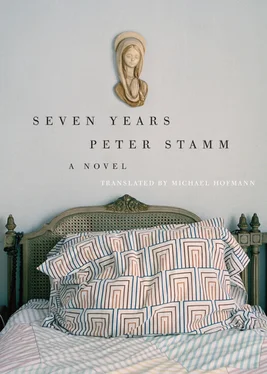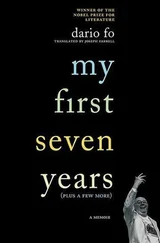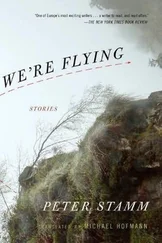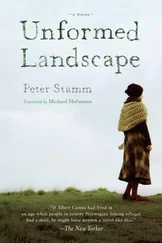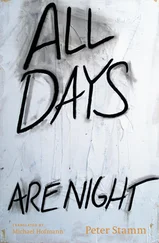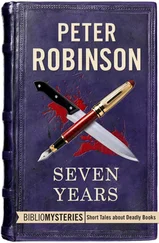Light and shadow reveal form.
LE CORBUSIER
Sonia stood in the middle of the brightly lit space; she liked to be at the center of things. Her head was slightly lowered, and she kept her arms close to her sides. She was smiling with her lips, but her eyes were narrowed, as though she were dazzled or in pain. Like the paintings on the walls, to which no one paid any attention but that were supposed to be the occasion for the presence of all these people, she seemed somehow not there, or only superficially there.
I was smoking a cigarillo, and watched through the plate glass gallery window as a good-looking man went up to Sonia and spoke to her. It was as though she woke up from her slumbers. She broke into a smile and touched glasses with him. His lips moved, and I could see an almost childlike astonishment come over her, then she smiled again, but even from where I was I could see she wasn’t listening to the man, she was thinking about something else.
Then Sophie was standing next to me. She seemed to have something on her mind as well. She said, Mama is the most beautiful woman in the world. Yes, I said, and I stroked her hair. She is, your mama is the most beautiful woman in the world.
It had been snowing since morning, but the snow melted as soon as it touched the ground. I’m cold, said Sophie, and she slipped back into the gallery, through the door that someone had just opened. A tall bald man had come out, with a cigarette between his lips. He stood far too close to me — as though we knew each other — and lit it. Ghastly pictures, he said. When I didn’t reply, he turned and took a couple of steps away. Suddenly he seemed a little uncertain and awkward.
I kept watching through the gallery window. Sophie had run in to Sonia, whose face brightened. The good-looking man, who was still next to her, looked sternly, almost offended, at the girl. Sonia bent down to Sophie, and the two of them had a short conversation, and Sophie pointed outside. Sonia shielded her eyes with her hand and peered in my direction with a strained smile, creasing her brow. I was pretty sure she couldn’t make me out in the darkness. She said something to Sophie and gave her a little push toward the door. I felt a momentary impulse to run away, to merge with the crowds getting off work and striding through the light that poured out of the gallery. The passersby glanced cursorily at the elegant, nicely dressed people within, and then hurried on their way, heading home with the rest of the crowd.
I hadn’t seen Antje for almost twenty years, and even so I recognized her right away. She must be about sixty, but her face was still youthful. Well, she said, and kissed me on both cheeks. Before I could say anything a young man with a silly-looking ornamental beard appeared by her side, whispered into her ear, and pulled her away from me. I saw him lead her to a man in a dark suit whose face was familiar, maybe from the newspapers. Sophie had collared the man who a moment ago had approached Sonia, and was flirting with him, to his evident embarrassment. Sonia listened with an amused expression, but once more I had the feeling her thoughts were elsewhere. I went over to her and laid my arm around her waist. I enjoyed the man’s jealous look. He was asking Sophie how old she was. Guess, she said. He pretended to think. Twelve? She’s ten, said Sonia, and Sophie said, you’re mean. You’re very much like your mother, said the man. Sophie thanked him with a curtsey. She’s the most beautiful woman in the world, she said. She seemed to know just exactly what was going on.
Do you mind if I take Sophie home now? Sonia asked. Antje will probably have to stay till the end. I offered to take Sophie home myself so she could stay, but she shook her head and said she was really tired. She and Antje had the whole weekend to look forward to anyway.
Sophie had asked her beau to fetch her a glass of orange juice. He asked if he could get anyone else a drink. Will you stop ordering other people around? I said. I wonder who she gets it from, Sonia said. She bit her lip and looked down at the ground and then into my eyes, but I pretended I hadn’t heard. We’re out of here, she said, and kissed me quickly on the mouth. Try not to make any noise when you get home.
The gallery started to empty, but it was a long time until the last of the visitors had gone. In the end, there was only Antje and me, and an elderly gentleman whom she didn’t introduce. The two of them were standing side by side in front of one of the pictures, talking together in such quiet voices that I instinctively left them alone. I flipped through the price list and kept glancing at the two of them. Finally Antje put her arms around the man, kissed him on the forehead, and walked him to the door. That was Georg, she said, I used to be crazy about him. She laughed. Weird, isn’t it? That was a hundred years ago. She went to the bar and came back with two glasses of red wine. She held one out to me, but I shook my head. I’ve given it up. She smiled doubtfully, emptied her glass in a single swallow, and said, well in that case, I’m all set.
The gallery owner had left the keys with Antje. She spent ages flicking the light switches until it was completely dark. Once outside, she slipped her arm through mine and asked if the car was parked nearby. It was still just snowing. What weather, she said. Next time we should meet in Marseilles. She asked me if I liked the paintings. You’ve gotten a little calmer, I said. Subtler, I hope, said Antje. I don’t understand art, I said, but unlike before, I could imagine having a painting of yours up on the wall at home. Antje said she wasn’t sure if that was a compliment or not.
I asked her if she had invited Sonia’s parents to the opening. I had expected them to be there. Antje didn’t reply. If you want to visit them, I can loan you the car, it’s just a hop and a skip to Starnberg anyway. Antje still didn’t say a word. Not until we got to the car did she answer that she hardly had any time, and she was too tired to go driving around the countryside. Getting the show ready had really taken it out of her. I asked her if there was anything the matter. She hesitated. No, she said, or maybe there is. They’ve gotten old and narrow-minded. Surely they always were, I replied. Antje shook her head. Of course Sonia’s parents were conservative, she said, but her father at least used to be genuinely interested in art. She had had many conversations with him about it. Of late, he had become more and more inaccessible, perhaps it was an age thing. He didn’t have any use for anything new, and had turned bitter. He doesn’t need to agree with me, she said, but I wish he would at least listen to what I have to say. The last time we met, we had a huge argument about Gursky. Since then I haven’t felt like seeing him.
I wondered whether there might not be other reasons for Antje not to see Sonia’s father. I often suspected there might have been something between them. When I ran it by Sonia once, she reacted indignantly, and said her parents had a good marriage. Just like us, I thought, and said nothing more.
Even though there wasn’t much in the way of traffic, it still took us a long while to get clear of the city. Antje didn’t speak. I looked across to her and saw she had closed her eyes. I thought she was asleep when she suddenly said she sometimes wondered if she had done me a favor back then. How do you mean? What with? Sonia wasn’t sure, Antje said. For a while neither of us spoke, and then Antje said Sonia wasn’t sure whether we were a good match. You mean if I was good enough for her? I asked. You had potential, Antje said, I think that was her word. The other boy … Rüdiger, I said. Yes, Rüdiger was fun to be with, but he wasn’t focused enough. And then there was someone else. She tried to recall the name. The one who later married the musician. Ferdy? I said. Maybe, said Antje.
Читать дальше
